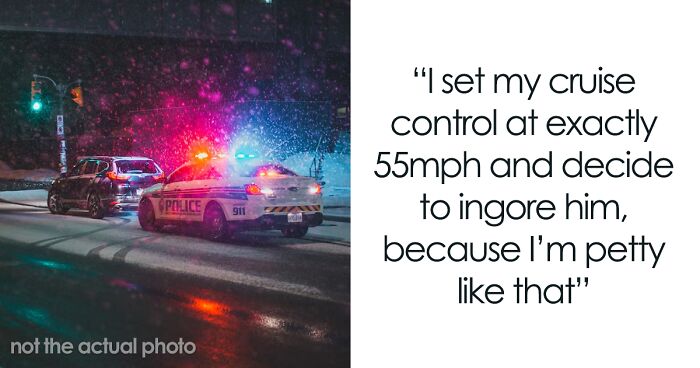
“I See Flashing Lights In My Rearview”: Tailgater Learns His Lesson The Hard Way As It Leads To Police Intervention
InterviewIf there’s one thing worse than sharing a road with a jerk, it’s sharing a road with a jerk at night. And Reddit user IceAriina is one of the people who has had to experience it.
She was driving home after a tiring long shift at work and was doing her best to stay safe. However, a random guy approached her car from behind in his vehicle and started tailgating the woman.
Luckily, IceAriina kept cool and handled the situation to the best of her abilities. Continue scrolling to check out her story on the subreddit r/PettyRevenge where she told all about it.
This woman was driving alone at night when another car started tailgating her
Image credits: Dario Fernandez Ruz (not the actual photo)
Even though she tried to let it pass, the guy behind her didn’t
Image credits: Erik Mclean (not the actual photo)
Image source: iceariina
We managed to get in touch with IceAriina and she was kind enough to tell us more about that night.
Luckily, during the encounter, it didn’t seem like there would be an accident. “The driver’s behavior was more impatient than aggressive or erratic,” IceAriina explained to Bored Panda. “I wasn’t concerned.”
“I mostly felt vaguely gratified and hugely relieved that I wasn’t speeding or making illegal maneuvers!”
Looking at the situation in retrospect, IceAriina said, “Had I thought of it, I may have put on my hazards and slowed down a bit more for them to pass. There was no shoulder for me to pull over, I’d have gone into the ditch if I’d tried. I’ve done that on other occasions, when possible.”
The author of the post shared more information in the comments
Generally, you shouldn’t be driving when you’re tired
Fatigue isn’t just about falling asleep. Even brief lapses in concentration can have serious consequences when you’re driving. When you’re exhausted, your brain can even enter short periods of sleep called ‘microsleeps,’ which can last from a fraction of a second, up to 10 full seconds. And the worst part is that you can’t control them.
In fact, being awake for more than 17 hours has a similar effect on performance as having a blood alcohol content of more than 0.05, so it’s best to not put yourself at unnecessary risk.
The warning signs of tiredness include:
- yawning;
- noticing your eyes closing for a moment or going out of focus;
- blinking more than usual;
- feeling drowsy;
- having trouble keeping your head up;
- forgetting the previous few minutes of driving;
- starting to ‘see’ things;
- droning and humming in ears;
- stiffness and cramps;
- aches and pains;
- daydreaming;
- experiencing slower reaction times;
- changing speed without reason;
- fumbling for gear changes;
- drifting in the lane or over lane lines.
If you’re behind the wheel, you should:
- take regular breaks (stop for at least 15 minutes every 2 hours);
- share the driving if you can;
- use rest areas, tourist spots, and driver reviver stops;
- stop and rest as soon as you feel tired;
- never drive for more than 10 hours in a single day.
How to handle tailgaters
Image credits: JÉSHOOTS (not the actual photo)
Remain calm. It’s essential to not escalate the situation because aggressive driving can have devastating consequences. Avoid yelling, gesturing in the direction of the tailgater, and doing anything else that could provoke them even more.
Let the tailgater pass. If you’re on a multi-lane road, move over to the right when it’s safe, giving the driver a chance to pass you on the left and if you’re on a single-lane road like IceAriina was, consider pulling into a well-lit parking lot or gas station.
Stay steady. Speeding up and slowing down can increase your chance of getting hit, so keep your speed consistent so the person behind you knows what to expect. It should allow them to pass when there’s an opening.
Don’t slam on your brakes. Slamming on your brakes to send the driver a message that you don’t like what they’re doing may feel tempting at the moment, but an accident won’t improve the situation. If you need to hit the brakes, do so slowly and steadily to give the car behind you time to react.
Be extra cautious. When someone is following you closely, it can be difficult to predict what they’ll do next, so be careful with your movements and pay special attention to what’s going on everywhere on the road, not just behind you.
“If you run into a road rager, do anything in your power to not stop your vehicle, and call 911,” IceAriina added. “Follow their instructions. Be safe.”
“Remember nothing is so important that you need to risk your own life and the lives of others to get there. Better late than dead.”
To make good decisions on the road, you need to practice
Image credits: NomadSoul1 (not the actual photo)
According to the experts at The RAC, a UK-based automotive services company that provides complete peace of mind to more than 12.7 million Brits, you need to put yourself out there in order to able to navigate situations like IceAriina found herself in.
They believe that if you’re just learning to drive or feel uncomfortable getting behind the wheel after sunset, getting experience in night-time driving can be extremely valuable. And it’s not that difficult — most driving instructors offer evening lessons to give their pupils more confidence.
And just in case, they advise you to stock up for the night in advance. “Every driver should be prepared in case of emergency,” The RAC folks wrote. “A torch is very useful if you suffer a breakdown… and need to inspect your car’s engine or change a tire. Even better – a head torch can free up your hands completely.”
“In case you get stranded or need to wait for assistance, it’s advisable to keep a blanket or warm clothing in the boot,” they added. “It’s also a good idea to keep your mobile charged and carry an ice-scraper or de-icer to clear your windows if the temperature drops.”
If you do break down, find a safe and well-lit place to stop and leave your hazard warning lights on while you wait for help.
And people thought she handled everything really well
Some even shared their own driving stories
If I'm being tailgated I slow down to about 20 or 25 mph. I can't control how close they are but I can control how fast we'll be traveling when they rear-end me.
Slamming the break is dangerous when you're tailgated and that pettiness can cost you dearly. But I found just tipping the break a tiny bit so the break lights flash up without you actually slowing down usually is enough to make them back off a bit.
That's called "brake checking" and can escalate a road rage incident. If I can't pull over to another lane, I will flash my emergency lights three times only in case the tailgater is simply not paying attention. Many times, they'll back off. If they don't, I let them pass at the first opportunity while maintaining my speed. Slowing down can be taken as a road rage gesture.
Load More Replies...I don't think drivers education/manuals teach about common courtesy on the roads. Tailgating is not safe and it illegal. I notice this more in younger people. If we're at a stop light and I can't see your headlights, you're too close.
Conversely, if you're behind someone and you can't see where their tires meet the pavement, you're too close.
Load More Replies...As a guy without a car, I don't get this part of car culture: "the sign says 55 max, so 65 is totally fine". I heard it in my country(Ukraine), now I hear / read it here. To me it sounds/looks like "It says no entry with dogs, but I hold mine on a leash, so that's okay" or, idk, "no entry without a mask on your face, but I am wearing a mask on my elbow so it's okay". Same nonsense. If the sign says 55, then your speed should be 55, no?
It should be, and most people do stay on/below the speed limit during the day. However, when it’s late and there are no cars or people around, some do drive above the speed limit. It’s not that it’s allowed, but there doesn’t tend to be anyone around to stop them, when it’s late like that.
Load More Replies...I live on a “neighbor” island with highways that are more like parkways or boulevards. Only one has a max speed of 60 for a short stretch with the rest 45 or 55. The average speed limit is 10 to 15 miles below that. It’s easy to identify the tourists and visitors from the “main” island, as they’re often tailgating, trying to pass and visibly frustrated at our slower pace. Island time, baby!! If someone is being a real jerk, it’s common for a local to pass them up and slow down to about 15 miles below the limit, forcing them to adapt to our leisurely pace on the roads.
Whoever said the speed limit is a maximum not a minimum is forgetting that driving to slow can also be illegal. Yes you're supposed to drive safely and driving slower in the middle of the night if it's raining is completely fine, but if you drive too slow even if it's late and heavy rain you can get in trouble for driving too slow since you shouldn't drive if you can't do it properly even in poor conditions. And I'm talking about people who think it's ok to go 25 in a 40 zone just because it's raining. You will get pulled over for that too if the cops notice you (at least where I'm from.) My rule of thumb is that 5 km over is ok and 10 km under is ok. If you can't keep that you shouldn't be driving in poor conditions. Although the best is of course to keep the speed
A few years ago on Christmas we were driving to my sister-in-law's. The roads were really bad after we crossed from one county to the next. Everyone on the highway slowed down to about 45 (in a 75 limit area) except this one guy. Still going the max limit and over in the lane marker to the right (forcing everyone he was passing onto the shoulder that was full of snow.) A few miles up, there he was in the median. Best Christmas ever!
If I can pull over safely and let them by, I will. If I can't, well, I live in New England. I'll aim my tires for every pothole, then swerve at the last second. They usually get the point after bottoming out 3-4 times. If not, I'll keep going the speed limit, but every time they get too close, I'll tap my brakes just enough to activate the brake lights but not enough to slow me down.
If I can't pull over to let them by I'll flash my emergency flashers for a second. Looks like I was braking lightly and they back off a little.
If I'm being tailgated I slow down to about 20 or 25 mph. I can't control how close they are but I can control how fast we'll be traveling when they rear-end me.
Slamming the break is dangerous when you're tailgated and that pettiness can cost you dearly. But I found just tipping the break a tiny bit so the break lights flash up without you actually slowing down usually is enough to make them back off a bit.
That's called "brake checking" and can escalate a road rage incident. If I can't pull over to another lane, I will flash my emergency lights three times only in case the tailgater is simply not paying attention. Many times, they'll back off. If they don't, I let them pass at the first opportunity while maintaining my speed. Slowing down can be taken as a road rage gesture.
Load More Replies...I don't think drivers education/manuals teach about common courtesy on the roads. Tailgating is not safe and it illegal. I notice this more in younger people. If we're at a stop light and I can't see your headlights, you're too close.
Conversely, if you're behind someone and you can't see where their tires meet the pavement, you're too close.
Load More Replies...As a guy without a car, I don't get this part of car culture: "the sign says 55 max, so 65 is totally fine". I heard it in my country(Ukraine), now I hear / read it here. To me it sounds/looks like "It says no entry with dogs, but I hold mine on a leash, so that's okay" or, idk, "no entry without a mask on your face, but I am wearing a mask on my elbow so it's okay". Same nonsense. If the sign says 55, then your speed should be 55, no?
It should be, and most people do stay on/below the speed limit during the day. However, when it’s late and there are no cars or people around, some do drive above the speed limit. It’s not that it’s allowed, but there doesn’t tend to be anyone around to stop them, when it’s late like that.
Load More Replies...I live on a “neighbor” island with highways that are more like parkways or boulevards. Only one has a max speed of 60 for a short stretch with the rest 45 or 55. The average speed limit is 10 to 15 miles below that. It’s easy to identify the tourists and visitors from the “main” island, as they’re often tailgating, trying to pass and visibly frustrated at our slower pace. Island time, baby!! If someone is being a real jerk, it’s common for a local to pass them up and slow down to about 15 miles below the limit, forcing them to adapt to our leisurely pace on the roads.
Whoever said the speed limit is a maximum not a minimum is forgetting that driving to slow can also be illegal. Yes you're supposed to drive safely and driving slower in the middle of the night if it's raining is completely fine, but if you drive too slow even if it's late and heavy rain you can get in trouble for driving too slow since you shouldn't drive if you can't do it properly even in poor conditions. And I'm talking about people who think it's ok to go 25 in a 40 zone just because it's raining. You will get pulled over for that too if the cops notice you (at least where I'm from.) My rule of thumb is that 5 km over is ok and 10 km under is ok. If you can't keep that you shouldn't be driving in poor conditions. Although the best is of course to keep the speed
A few years ago on Christmas we were driving to my sister-in-law's. The roads were really bad after we crossed from one county to the next. Everyone on the highway slowed down to about 45 (in a 75 limit area) except this one guy. Still going the max limit and over in the lane marker to the right (forcing everyone he was passing onto the shoulder that was full of snow.) A few miles up, there he was in the median. Best Christmas ever!
If I can pull over safely and let them by, I will. If I can't, well, I live in New England. I'll aim my tires for every pothole, then swerve at the last second. They usually get the point after bottoming out 3-4 times. If not, I'll keep going the speed limit, but every time they get too close, I'll tap my brakes just enough to activate the brake lights but not enough to slow me down.
If I can't pull over to let them by I'll flash my emergency flashers for a second. Looks like I was braking lightly and they back off a little.

 Dark Mode
Dark Mode 

 No fees, cancel anytime
No fees, cancel anytime 






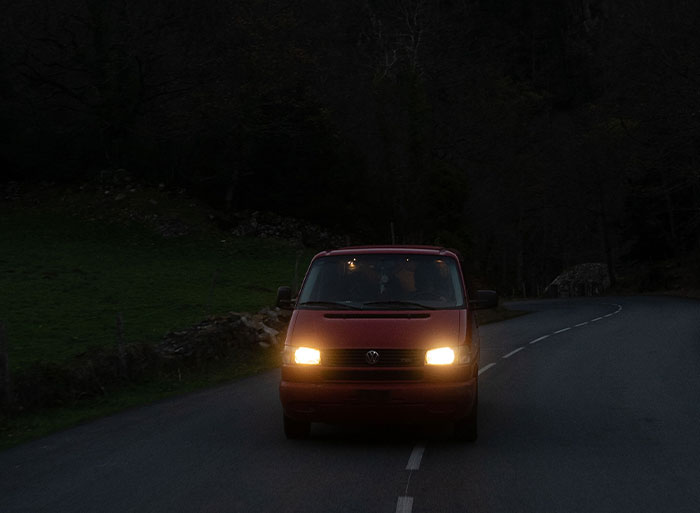
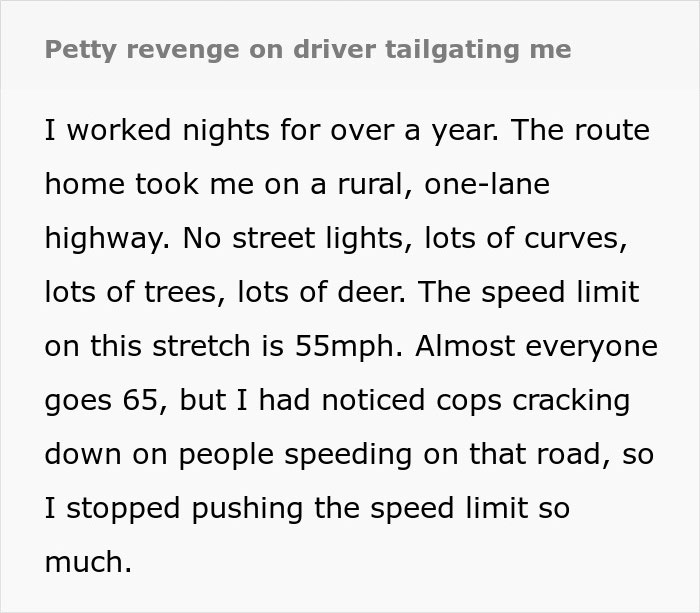

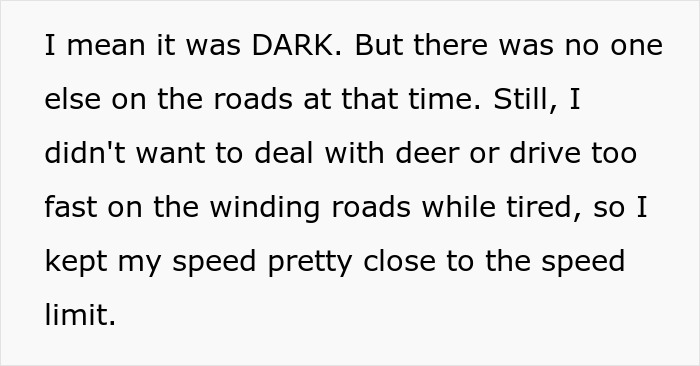
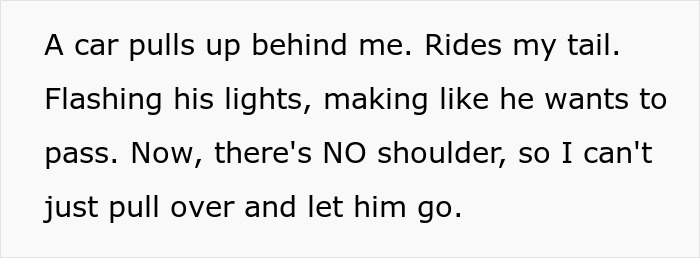
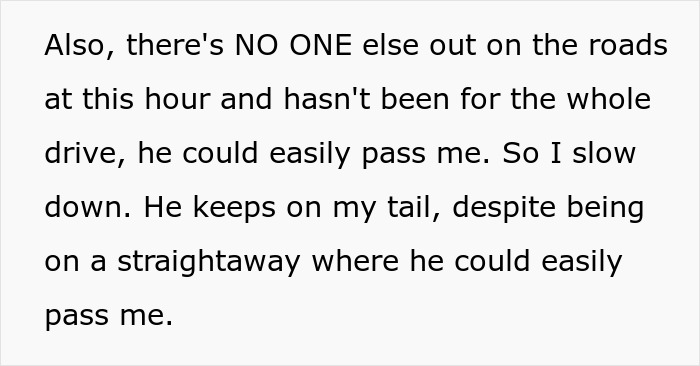
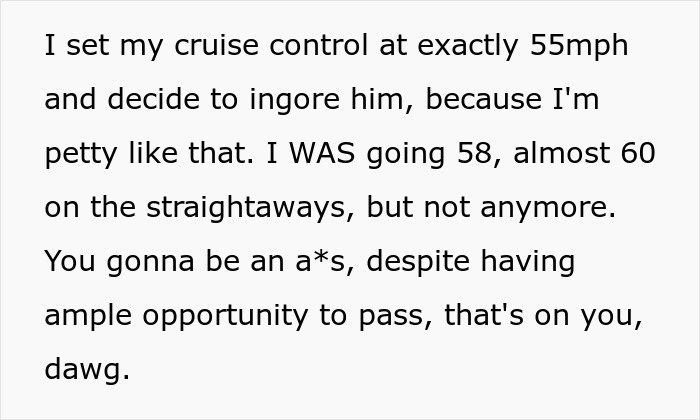
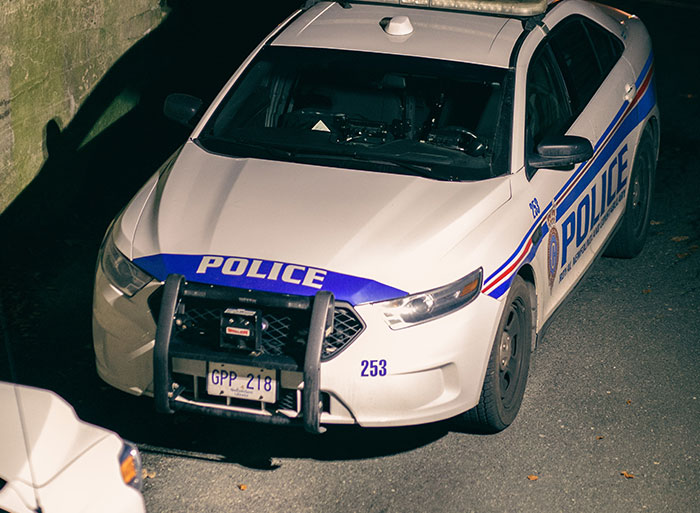
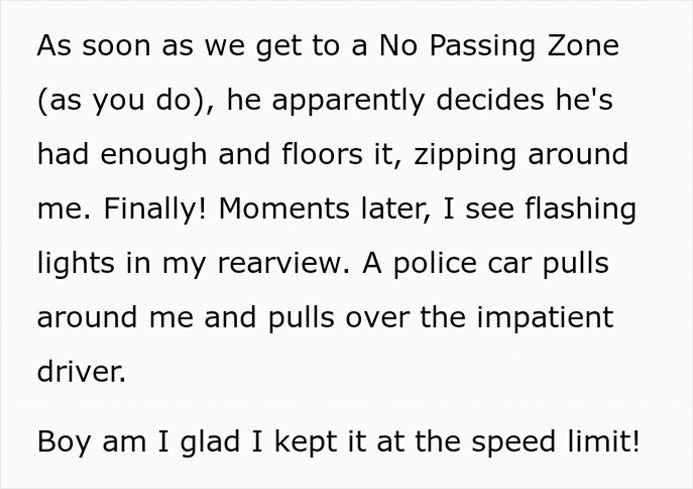

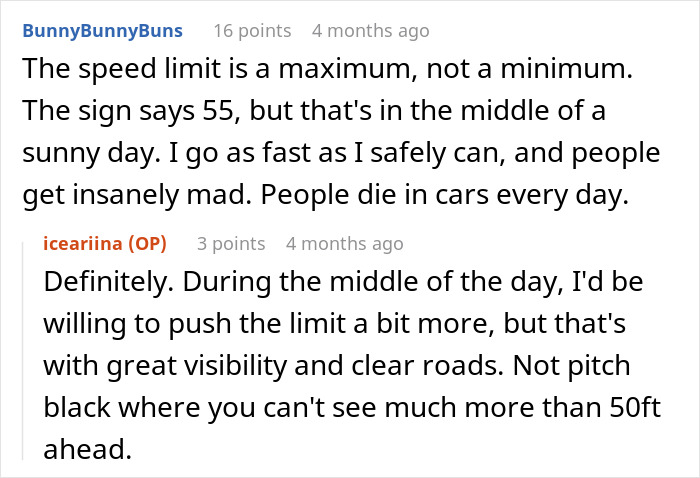
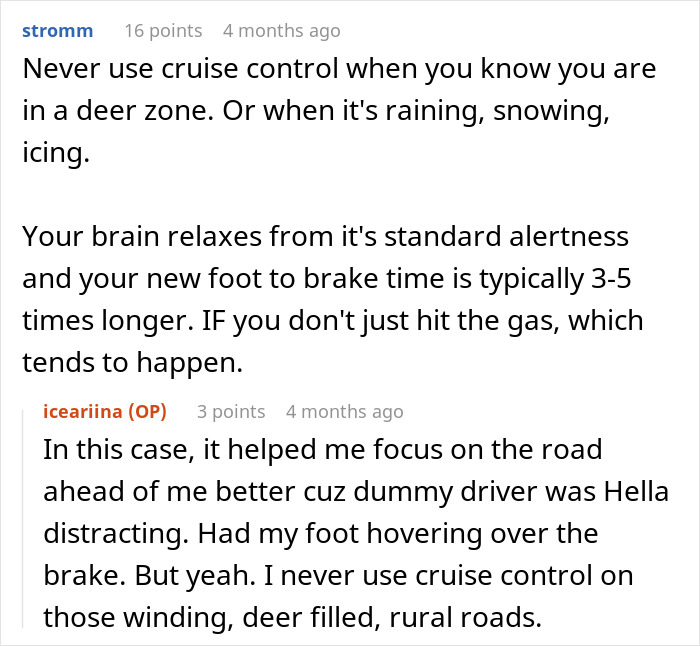
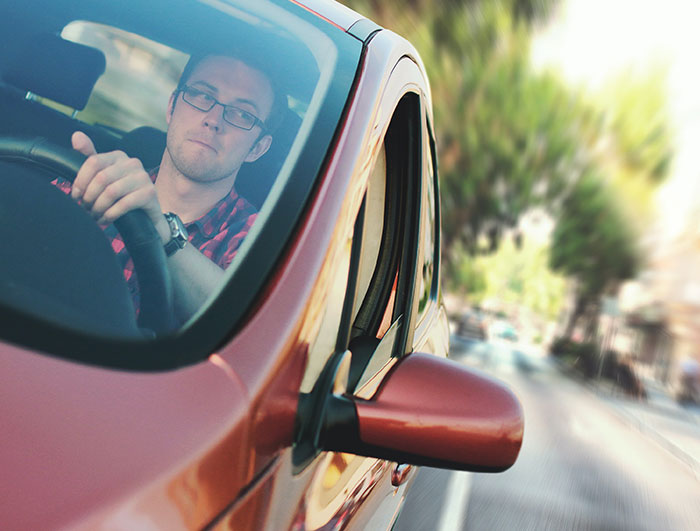
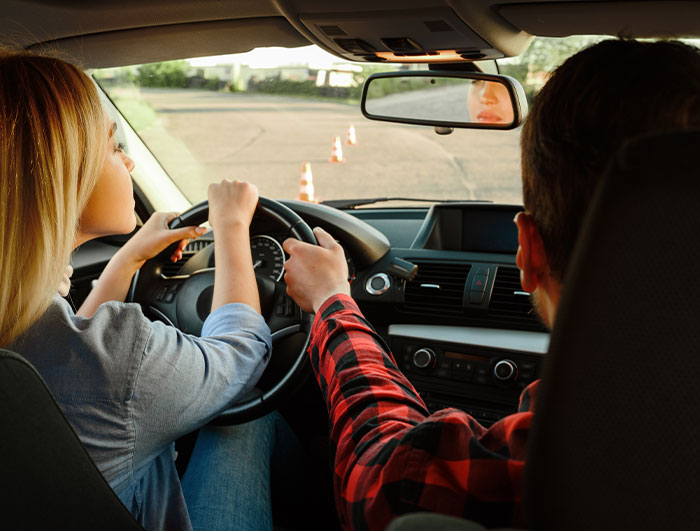

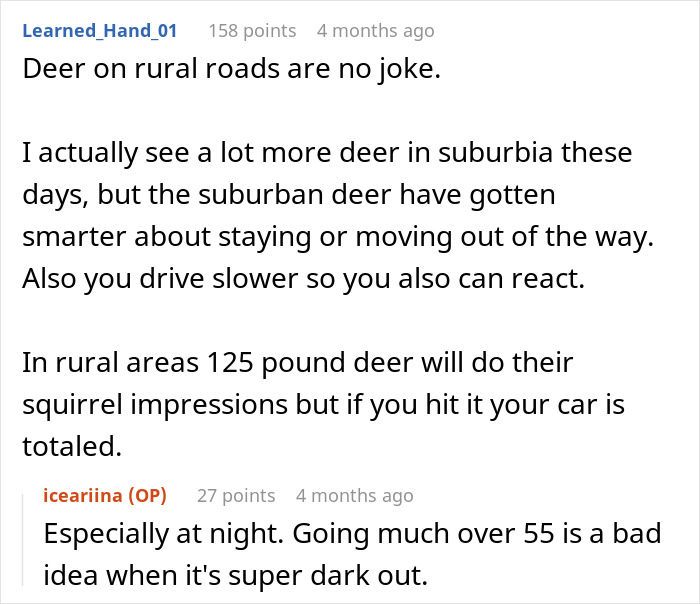
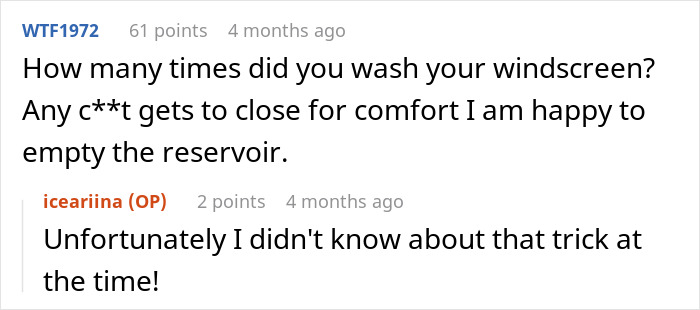
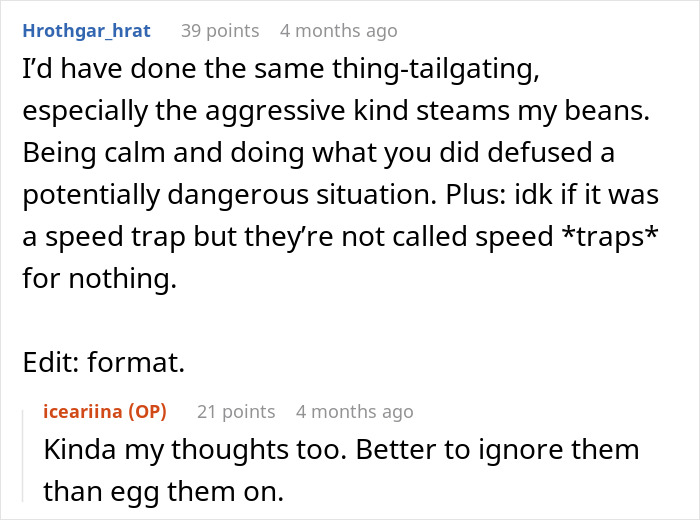


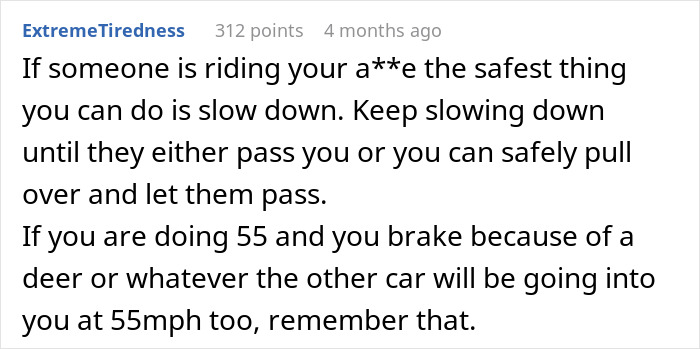
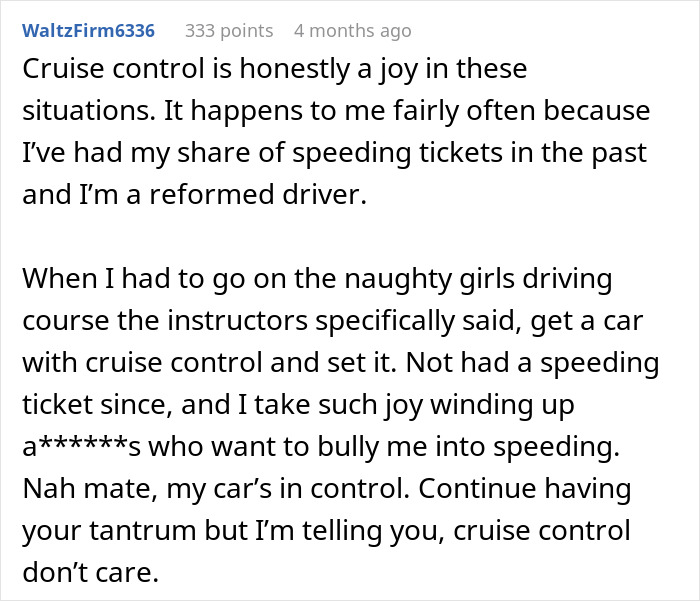
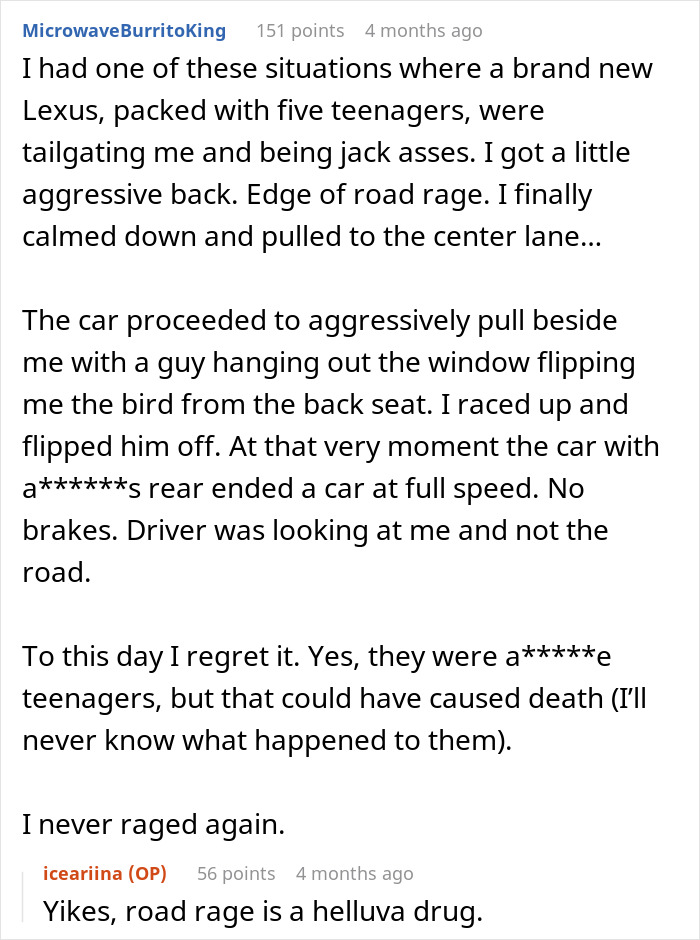
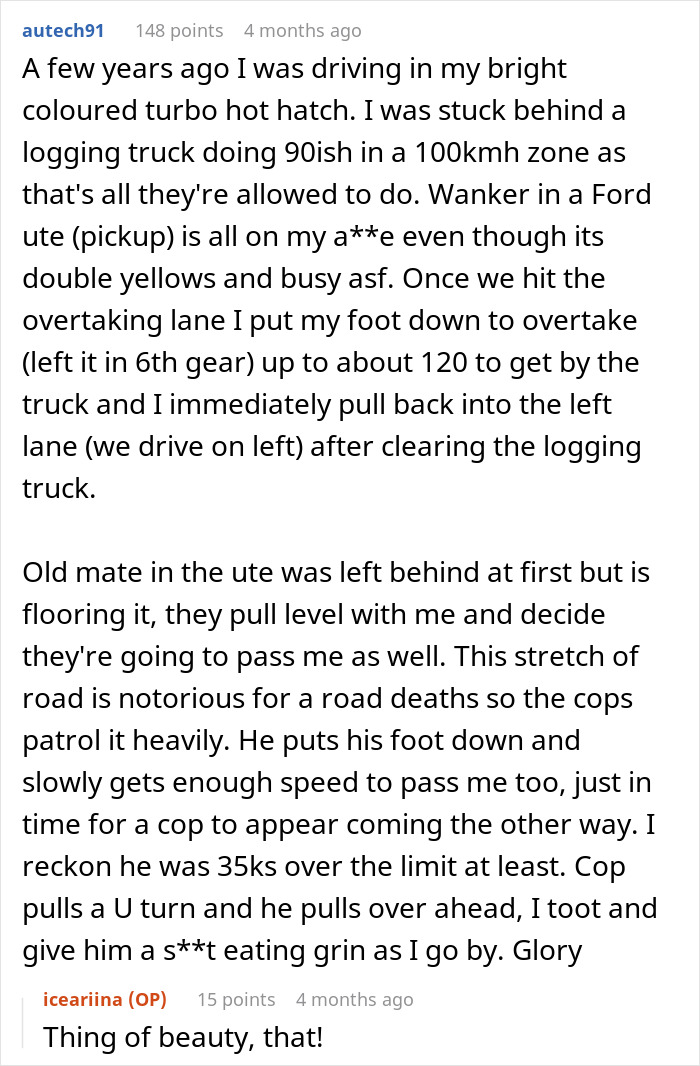
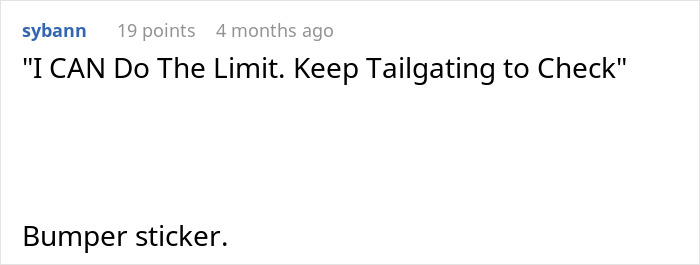
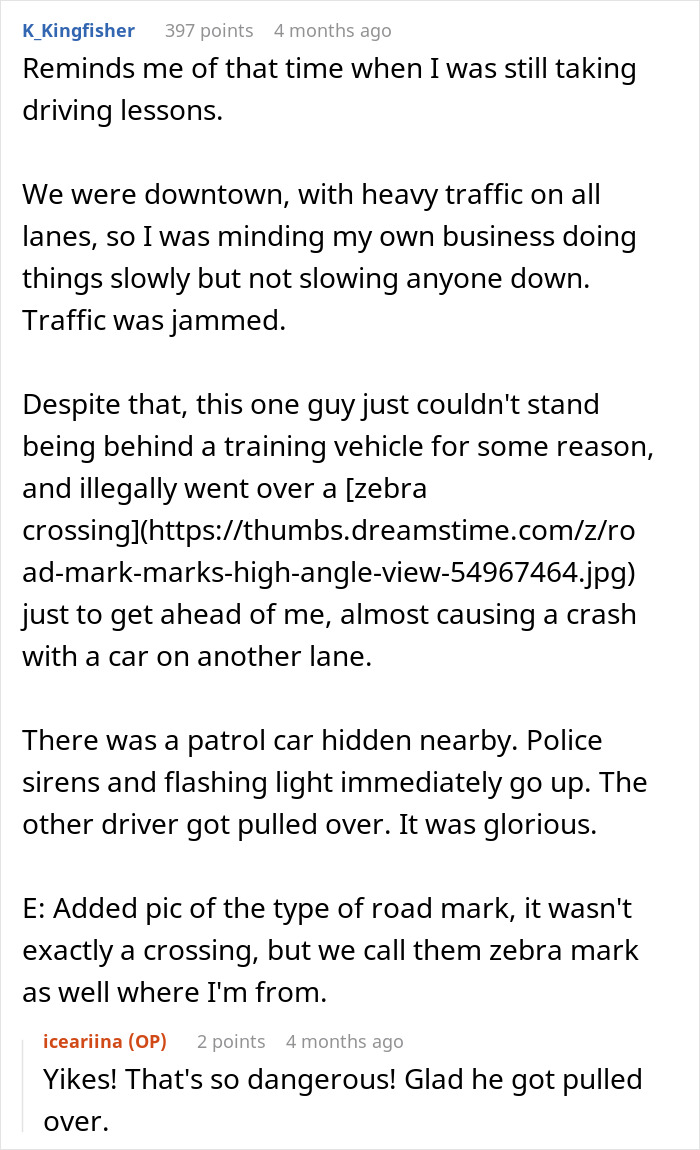
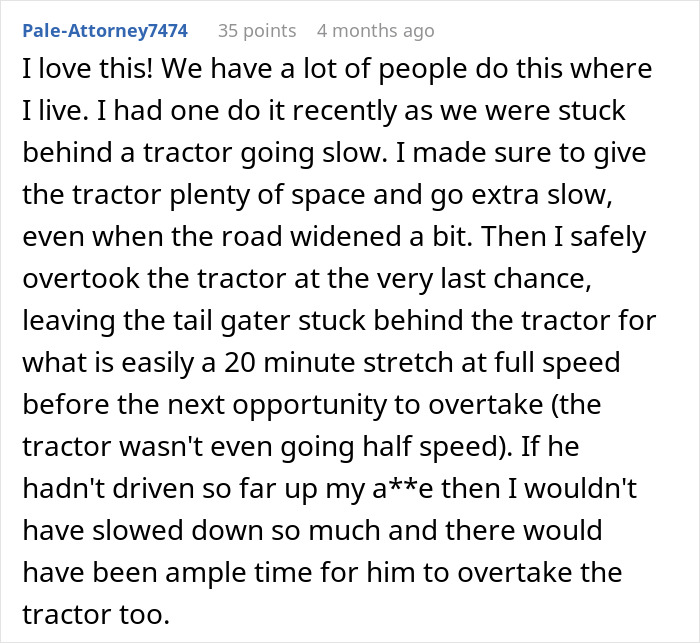
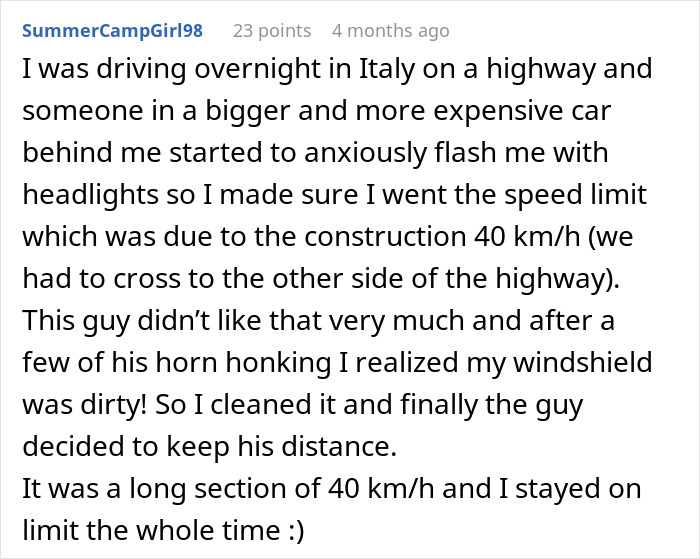
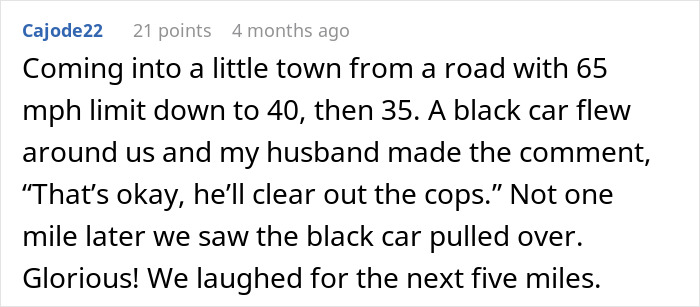












































72
27